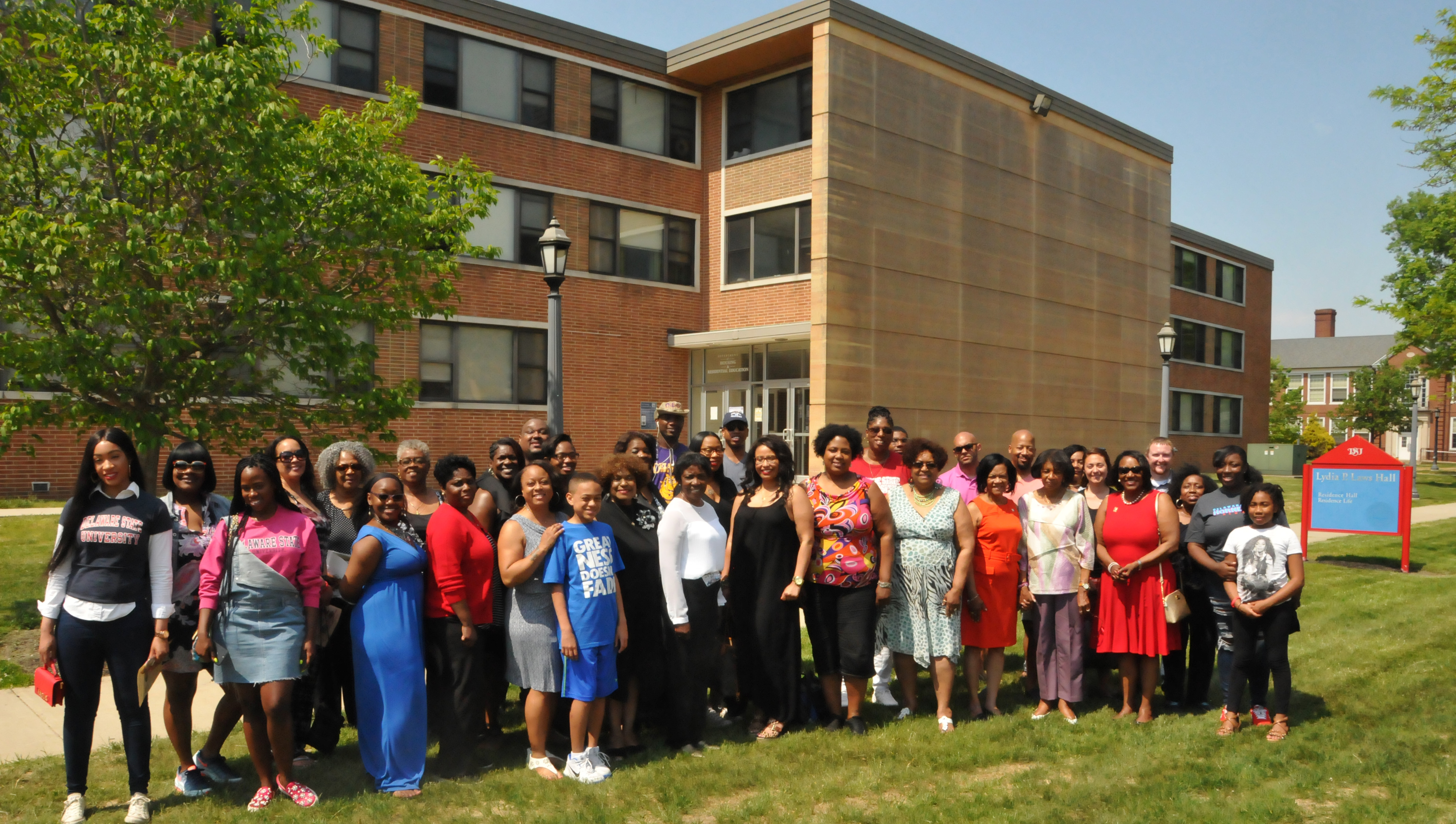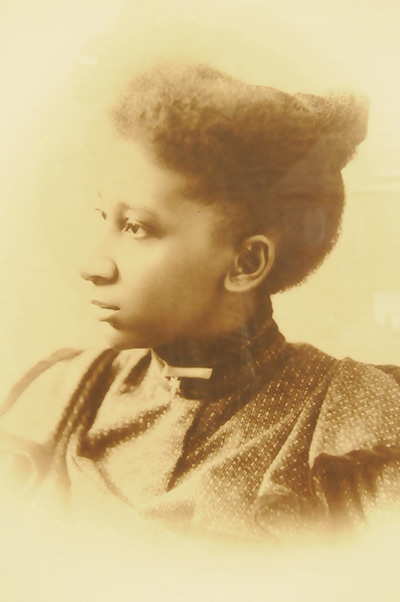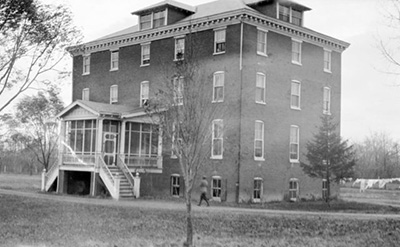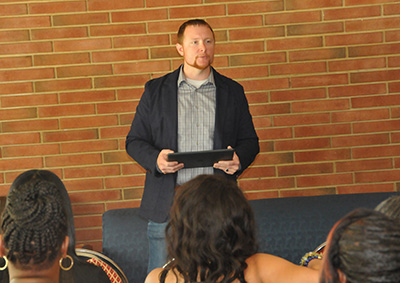
DSU says goodbye to Lydia Laws Hall
Members of the University community and alumni gathered May 12 to share the history of Laws Hall on the weekend before the demolition of the 56-year-old building to make way for a new residential facility.
The event took place in the former Laws television room following the 132nd Commencement Ceremony. Among the attendees were onetime residents and resident assistants who had lived and worked in 110-bed Laws Hall over the years.
State Rep. Stephanie Bolden, Class of 1968, a resident as a freshman, was one of the participants who shared their memories. She talked about the rules and discipline the young college women who lived there in the 1960s experienced.
J.D. Bartlett, DSU assistant vice president of Capital Planning and Environmental Sustainability, spoke about the new 620-bed residential hall that is projected to be completed by August 2019. He noted that in addition to residential rooms, the five-story structure will also include a new dining facility and a ground floor innovation center that will create a critical connection between the University’s academic programs and student affairs.
Mr. Bartlett also talked about Lydia Laws, the outgoing building’s namesake.
Lydia Laws was a Delaware native who was educated at Clark University in Atlanta. She was the first female instructor and matron hired by the fledging State College for Colored Students, beginning her tenure at the institution in 1897.
She began as the primary instructor in the College’s then-new Normal School (teacher education program); she also taught U.S. history and English literature in the College’s Preparatory School. She would also teach physiology for a couple of years.
However, her teaching demands notwithstanding, it was overseeing the welfare of the growing number of female students on campus that became a significant focus of her work.
The College welcomed its first women as students during the 1893-1894 school year – four freshmen and two preparatory students. By 1895-1896, that number grew to six in the College and five in the preparatory school. It is highly likely that Ms. Laws’ 1897 hire was driven in large part by projections that the number of women pursuing studies on campus would continue to grow.
By 1900, the female population on campus reached 18 – nine in the College and nine in the Preparatory School. Only one of those young women were from Dover, meaning almost all, if not all, lived on campus. This would necessitate the construction of Lore Hall in 1901 as a female dormitory. Part of Ms. Laws’ responsibility was to oversee that women’s facility.
In his 1912 report to the Board of Trustees, President William Jason – who Ms. Laws worked under throughout her 17-year tenure – noted the following: “When girls were admitted as boarding students, the services of a Matron were required. This position has been filled satisfactorily by the same person for fifteen years.” Although he doesn’t mention Ms. Laws by name in this excerpt, it is clear that she is the subject of that commendation.
As matron, Ms. Laws not only oversaw the living arrangements of female students. Students were also required to assist with the chores of the campus, and the domestic tasks – sewing, cooking, laundering, etc… – fell to the women on campus. Most women were enrolled either in the Normal School or pursued a degree in Home Economics, so the domestic work they did at the College was consistent with their career paths to teach or work in the domestic arts discipline.
By 1907 all such activities were consolidated under Domestic Sciences. Although Ms. Laws did not teach all aspects, she directed all of the activities. By 1911, it would be classified as the Domestic Sciences Department and would continue to be under her oversight during that first year.
By the 1913-1914 school year – her last year with the College – Domestic Sciences was no longer listed as one of her responsibilities. President Jason’s 1912-1913 annual report notes the hiring of a Mrs. Theresa H. Anderson as the Domestic Sciences instructor as well as to handle all the responsibility food purchase and preparation services for the campus. Furthermore, the faculty listing for the 1913 catalogue lists Helen M. D. Truxon as the superintendent for the Domestic Science Department and instructor of Home Economics.
In that same 1913 catalogue, Ms. Laws is listed as a preceptress (an archaic term for instructor or head mistress) in the areas of composition, English literature and pedagogy. Presumably, she was still connected with the Normal School and the Preparatory School in that final year.
Ms. Laws is not listed among the faculty in the 1914 catalogue. In his 1913-1914 annual report, in noting a few faculty members who had left the institution, President Jason wrote the following:
“But the name most familiar from long association and the person most efficient during seventeen years of service will be conspicuous by absence. Miss Lydia P. Laws relinquishes her duties as teacher and Matron to preside over a home of her own. She leaves a vacancy difficult to fill, but none who knows of her good work here, but wishes her joy in the new life.”
There are indications that she may have gotten married, and that might have been a factor in her departure from the College. University historians are continuing to research her life after she left the State College for Colored Students.
In the May 11, 1910 edition of The Echo (the student newspaper of the College at that time), Ms. Laws revealed her thinking about the place of women in the early 1900s when she wrote the following article:
The Business Woman
By Lydia Laws
At no time in the history of the world has the need been greater than at present for well-balanced women, women who are capable because of their moral, religious, and intellectual development combined. In the home, in the school, in the office, in all walks of life (a) woman’s presence is needed, her absence is sorely felt. As a mother, daughter, sister, wife, or teacher, her presence is either a boon to those around her, or her absence leaves a void which only such a woman could fill.
The general trend of affairs had made woman dependent upon man for all the necessities of life. Usages of society declared that she should not enter upon many pursuits which are now open to her. Today, the situation shows that other ideas have been awaken relative to her. She is taking her place in the financial world, she is learning that the protection of her interests depends upon the protection and interest that she extends to others.
There is a question as to the effect that a business life exerts upon woman. Some claim that she becomes bold, too independent and world-wise, in short, that she is likely to lose her respectability by entering the more extended fields of knowledge. Never a broader mistake. If a business life gives us a woman independent and worldly-wise, or not blind to the value of a dollar, if fits her all the better for the higher duties of home life, duties which require women of keen ability, financial and otherwise.
It is no longer necessary for mother to say, when asked a simple question about money matters, I do not know son, ask your father, of if misfortune should come, that she should suffer because of her ignorance of what is right under the law.
We note growth of organizations managed by women; the interest which she is taking in the affairs of government, the desire to know everything that will help in the development of her country.
To become a well-equipped business woman will not detract from womanliness. On the contrary, those are good qualities which make the true woman of the home, will also make the true woman of the business centre.
Of course, in this as in any other honorable labor, woman should be able to decide if is shall be her vocation.
A good woman will have certain restrictions for herself. A woman who knows her place before the law wields an influence that can be hardly realized; and who shall say that that influence will not be for the good of all.
Editor’s note: While Carlos Holmes researched Lydia Laws and wrote the article, credit for unearthing this hitherto largely unknown article by Ms. Laws goes to J.D. Bartlett, DSU assistant vice president of Capital Planning and Environmental Sustainability, who found it on the internet.

